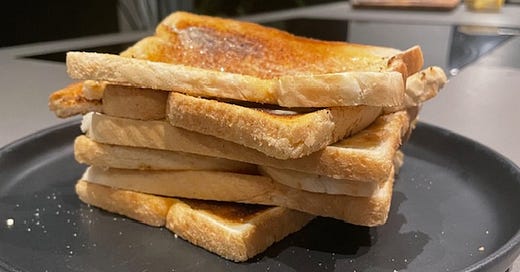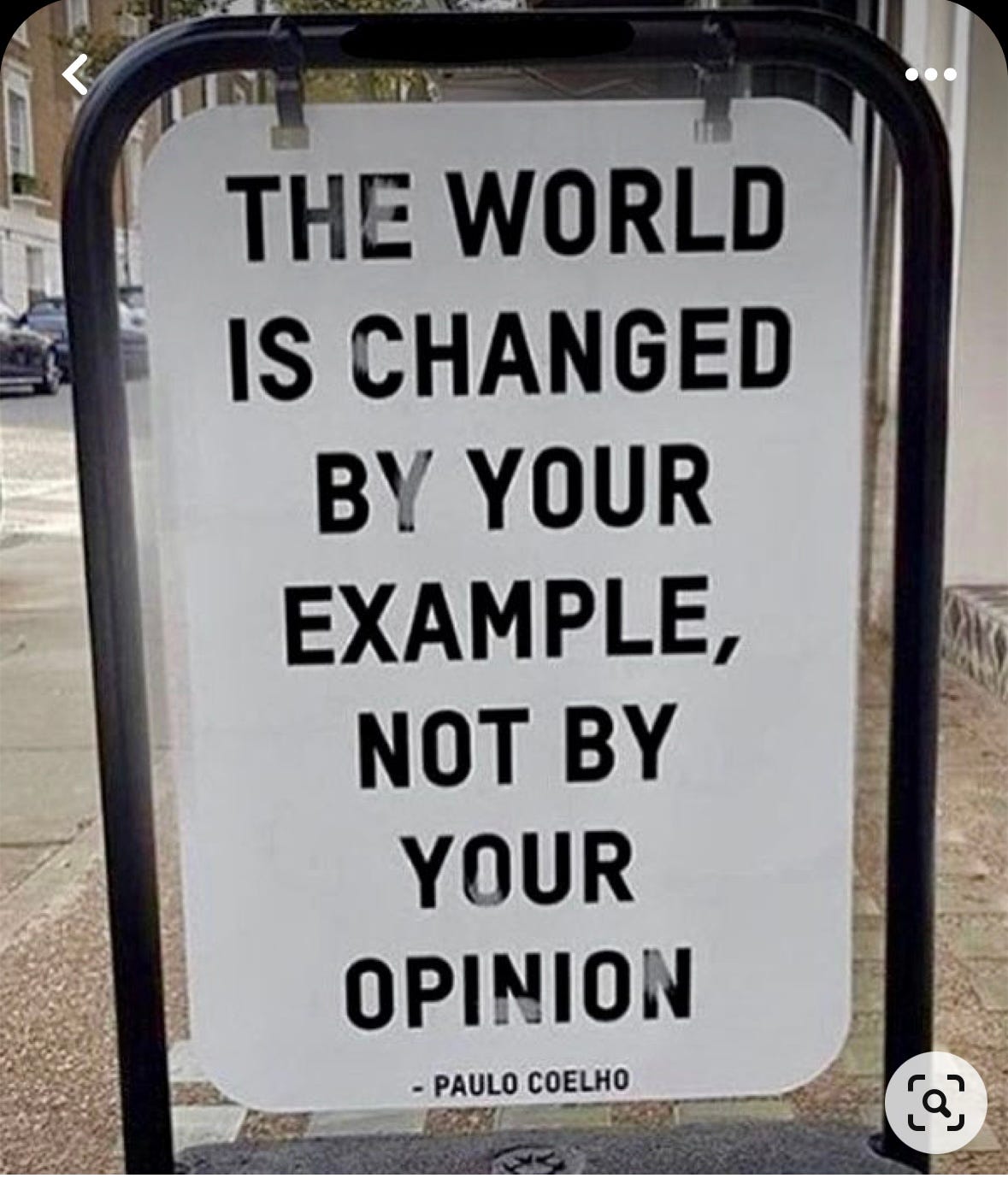On Monday evening, there was a large pile of toast on my worktop, white bread of course, heavily buttered, cut diagonally into rough triangles. It was a simple feast, prepared to feed the three teenage girls who had just arrived in from fourteen hours at a sports’ camp. This year, there were no residential places available and so they’d opted to create their own version of a residential. They would sleep over at each other’s houses. Suitcases, rucksacks, hockey bags appeared at our house on Sunday. There was a makeshift sleeping arrangement involving the relocation of a double mattress and a lot of pillows. They’d stay for two nights, pack up and move on to another house on Tuesday. They’d leave behind a pink toothbrush in the downstairs toilet, various chocolate wrappers, a lip gloss, empty plates, some crumbs. It was just a pile of toast but it became suffused with symbolism. As they came in, tired, happy, excited about the next day, home, I’d been watching the news. Gradually, details were emerging of the terrible events in Southport, a Taylor Swift-themed dance class in the summer holidays becoming an incomprehensible tragedy. Over the next few days, more details would emerge, the loss of three little lives, the thin body of the instructor slashed with knife wounds as she’d tried to protect them, the businessman who had rushed in from his office next door when he heard the screams. He had undergone major surgery. He wished he’d done more. I’d read how some events are off the scale of human understanding. There were far-right protests across England, mosques were being targeted. The response to the violent attacks was more violent attacks. It seemed these protests could extend to Belfast, to where I live. A post on social media talked about stopping the spread of evil Islam, how the Christian West was under siege. They wanted to bring the country to a standstill. Women and children to the front, they said.
This week, I’d read article after article about the Olympics. There were two gold medals in one night for Northern Irish competitors, Magheralin was now on the map, Andy Murray tweeted how he didn’t really like tennis anyway, someone brought Clare Balding a tissue when he played his final match, a mystery man went viral after diving into the Olympic pool to retrieve a swimming cap, Simone Biles had much to teach us about knowing when to rest. But most of the articles were about the controversy of the opening ceremony. It just wouldn’t go away. But then I wondered was it me, was it because of the things I subscribe to, the blogs I read, the circles I move in, the people I am connected to on Facebook, the perspectives I am subjected to. I hadn’t watched it. I’d switched off after the endless flotilla of boats on the Seine, the athletes in their plastic ponchos waving in torrential rain. My daughter was obsessed with the order of the boats which seemed to be mainly alphabetical yet also not. But I couldn’t help comparing the size of the boats, the size of the teams, the distribution of power. Team Bhutan had three athletes and a vintage mahogany Venetian yacht, Team USA had one of the largest vessels, a 416-passenger one, normally used for river cruises. I found out about the controversy the next morning. There was outrage about the supposed reinterpretation of The Last Supper. It was an attack on Christianity, a mockery of the Christian faith. It was Babylon, it was blasphemy, it was a violation of religious imagery, it was secular, it was drag queens. It was offensive. After a while I couldn’t read the comments anymore, the “How dare they” and the having to change channels and the sign of the times and the “Dear me” as someone posted yet another link because once they’d found one example of mockery, they had to look for more. The controversy went on and on. It wasn’t Da Vinci’s The Last Supper, it was Jan van Biljert’s1 Feast of the Gods from 1635, the blue man wasn’t a smurf, he was the Greek god Dionysus, the Olympian god of wine and pleasure and festivity and madness. There was an apology from the organising committee for unintended offence. It was meant to be a celebration of diversity, to raise awareness of the absurdity of violence between human beings, a bit of a pagan party. Those offended didn’t believe this. It was a lie. Thomas Jolly, the artistic director knew exactly what he was doing, they said. They were pleased with Elon Musk for taking a stand, not so pleased with Biden and Harris for not taking one. The courage of the women, Celine Dion doing her first live performance since being diagnosed with stiff person syndrome at the top of the Eiffel Tower, Marie Antoinette holding her severed head, Lady Liberty barely got a look in. The responses became more nuanced, less knee-jerk reactive. There were explanations about how to interpret art, reminders that The Last Supper was one artist’s depiction of a Biblical scene, how even though many of the offended were now experts on the Renaissance period, no one knew if Jesus and his disciples were all behind a long table or whether there was a tablecloth. I wondered how many had actually seen the fresco on a refectory wall in a convent in Milan. I had. I wasn’t sure I’d have put two and two together if I hadn’t been told Paris 24 had parodied it. I wondered who noticed the similarities, who chose to be offended first, who started the ball rolling. It was noted that the painting of The Last Supper was not in itself the act of the Last Supper. It had been parodied many times before, The Simpsons, MASH, Battlestar Galactica, and people hadn’t been offended then. Perhaps there was an anti-LGBTQ stance this time. The very balanced emphasised how all are welcome at Jesus’ table, how Jesus does not ask his followers to defend Him, how he calls them instead to defend the poor, the marginalised, the oppressed, the suffering. But the posturing continued. There was talk of old-guard evangelicals demanding their rights, how it was more about a protection of Western cultural values than the Gospel.
There were lots of other stories in the news this week, BBC presenter Huw Edwards pleaded guilty to three counts of making indecent images of children, Bob Ballard, an Australian commentator was sacked for making a sexist joke about a female swimming team, a black female soldier who fronted British Army recruitment campaigns accepted a substantial settlement from the Ministry of Defence after suffering years of racist bullying and harassment, one reporter standing at the scene in Southport reminded us that most children are not killed by strangers. She referenced Dunblane almost thirty years ago as the most recent example of a similar tragedy. Most are killed by their own parents, by people they knew and trusted, she said. I couldn’t decide if this was a trite comment or the most frightening thing I had ever heard.
Some of you may or may not know I go to church. I mention it from time to time. I’ve had an interesting relationship with it over the last couple of years. I still think the local church has got a lot of things right like being part of a caring community and singing together is apparently good for mental health and there are benefits to contemplative thankfulness but more and more I find myself wanting to distance myself from anything to do with the institutional church, not because of a change in my theology or a dumbing-down of my faith or a backsliding, it is to do with the way in which people are choosing to exercise their beliefs. I want to distance myself from a cultural Christianity that requires evidence of belonging like using the right words and doing the right things and looking like everyone else. I want to distance myself from something that is so easily offended by the diversity of humanity, that is completely unable to deal with nuance, that can only operate within the parameters of black and white, one that centralises some, usually the white, male, middle-class, diminishes others and banishes the many. I want to distance myself from something that values protection of the institution over the protection of the individual. But what I am more and more concerned about is what those who claim Christianity are not offended by.
Providing warm spaces and foodbanks is admirable but it does not tackle the underlying causes of poverty. Thoughts and prayers are kind and considerate, but they do not erase injustice. I see silence on genocide because of fear of taking a stand. I have heard very little outrage about Gaza. I have heard very little outrage about domestic abuse. I have heard very little outrage about the increase in violence towards women. I have heard very little outrage about sexism and inequality. Loving our neighbour does not mean inviting them to church, to join us where we are. It involves using some of our privilege to help them where they are. “And our hardest and holiest work is not to look away”2.
When I think about the news this week, I think of the yelling about the Olympics opening ceremony, the silence at so much else, I think about a man who wished he’d done more and a woman who put herself in front of others to protect them.
“The world is changed by your example, not by your opinion,” said Paulo Coelho.
Who?






I didn't watch the Olympics opening ceremony, so don't know whether to be offended or not and won't be watching it to find out what I missed.
"Loving our neighbour does not mean inviting them to church, to join us where we are. It involves using some of our privilege to help them where they are. “And our hardest and holiest work is not to look away" There is the challenge for congregations - to go where you are needed with no agenda.
Thanks for this Deborah. I read it having felt confused about the responses to the week’s events. I understand why people are angry and I think it’s extremely important to be able to express an opinion, to stand up for the downtrodden and the suffering but positive actions and prayer must surely be the lynchpin of the Christian response. Thank you for challenging me to question my response.